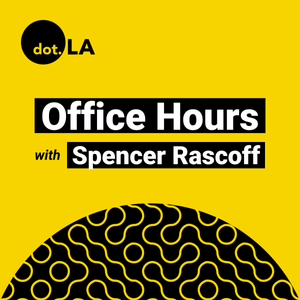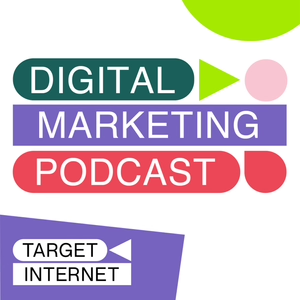
Moving Through Change: Adaptation & Improvement with Erik Kruger from the Expansive - EP24
09/29/23 • 40 min
This episode is part 1 of a 2 part series with with The Expansive (https://theexpansive.com/) podcast. I had a great time hosting Erik and John - I know you will enjoy the episodes!
In this episode of the Dunamis EQ Leadership Podcast, we have the privilege of welcoming Erik Kruger to the show. Erik is here to discuss the process of dealing with the ending of something and the importance of being in the wilderness for inner reorientation.
Erik shares his insights on the necessary closure that comes with endings and how being in the wilderness is a time of reconfiguring one's identity. He emphasizes that this period of inner reorientation is crucial and explains how people who have just ended a long-term relationship may not be interested in dating again during this time.
A key theme throughout the episode is the role of emotional intelligence in choosing how we respond to various stimuli. Erik dives into the importance of self-awareness, understanding our patterns, beliefs, and triggers, and using that knowledge to modulate our interactions with others. He highlights the significance of considering the impact of our words and behaviors on those around us.
They explore the art of being a good host and creating a space where individuals can feel heard and understood. They delve into the concept of the wilderness and how it can be relevant and comforting, especially in challenging times like the COVID pandemic.
Erik, who works with high performers, also shares his desire to find a way to accelerate the process of going through the wilderness effectively. While acknowledging that trying to rush through it is not the point, they discuss the importance of embracing each phase of the wilderness, as each serves a specific purpose.
Throughout the episode, Erik emphasizes the significance of receiving input and feedback from others. They stress that self-awareness practices can only take a person so far and that being open to feedback without getting upset or feeling inferior is key to growth.
The conversation takes an introspective turn as Erik reflects on their own journey of reinvention. They discuss the challenges of leaving behind past identities, communities, and expectations. Erik shares personal experiences of navigating through the periods of turmoil that come with transitioning from one phase of life to another.
In sharing their own story, Erik touches on the difficulty of changing one's perception of oneself and how reinvention requires letting go of old identities, both externally and internally. They speak to the challenges of breaking free from the boxes others try to fit us into and finding acceptance in our ever-evolving selves.
As the episode progresses, Erik delves into their work with leaders and teams, discussing the importance of adaptability and change in the modern world. They talk about the necessity of developing change as a skill rather than expecting it to happen naturally.
The conversation concludes with insights into triggers and their potential to ignite both negativity and curiosity or opportunity. Erik shares personal anecdotes about triggers in their own life and how they've come to recognize and harness them for growth.
Overall, this episode with Erik Kruger provides a wealth of knowledge and wisdom for listeners. It offers a deep dive into topics such as endings, emotional intelligence, reinvention, and the role of triggers in personal and professional growth. Tune in and discover valuable insights for your own leadership journey.
This episode is part 1 of a 2 part series with with The Expansive (https://theexpansive.com/) podcast. I had a great time hosting Erik and John - I know you will enjoy the episodes!
In this episode of the Dunamis EQ Leadership Podcast, we have the privilege of welcoming Erik Kruger to the show. Erik is here to discuss the process of dealing with the ending of something and the importance of being in the wilderness for inner reorientation.
Erik shares his insights on the necessary closure that comes with endings and how being in the wilderness is a time of reconfiguring one's identity. He emphasizes that this period of inner reorientation is crucial and explains how people who have just ended a long-term relationship may not be interested in dating again during this time.
A key theme throughout the episode is the role of emotional intelligence in choosing how we respond to various stimuli. Erik dives into the importance of self-awareness, understanding our patterns, beliefs, and triggers, and using that knowledge to modulate our interactions with others. He highlights the significance of considering the impact of our words and behaviors on those around us.
They explore the art of being a good host and creating a space where individuals can feel heard and understood. They delve into the concept of the wilderness and how it can be relevant and comforting, especially in challenging times like the COVID pandemic.
Erik, who works with high performers, also shares his desire to find a way to accelerate the process of going through the wilderness effectively. While acknowledging that trying to rush through it is not the point, they discuss the importance of embracing each phase of the wilderness, as each serves a specific purpose.
Throughout the episode, Erik emphasizes the significance of receiving input and feedback from others. They stress that self-awareness practices can only take a person so far and that being open to feedback without getting upset or feeling inferior is key to growth.
The conversation takes an introspective turn as Erik reflects on their own journey of reinvention. They discuss the challenges of leaving behind past identities, communities, and expectations. Erik shares personal experiences of navigating through the periods of turmoil that come with transitioning from one phase of life to another.
In sharing their own story, Erik touches on the difficulty of changing one's perception of oneself and how reinvention requires letting go of old identities, both externally and internally. They speak to the challenges of breaking free from the boxes others try to fit us into and finding acceptance in our ever-evolving selves.
As the episode progresses, Erik delves into their work with leaders and teams, discussing the importance of adaptability and change in the modern world. They talk about the necessity of developing change as a skill rather than expecting it to happen naturally.
The conversation concludes with insights into triggers and their potential to ignite both negativity and curiosity or opportunity. Erik shares personal anecdotes about triggers in their own life and how they've come to recognize and harness them for growth.
Overall, this episode with Erik Kruger provides a wealth of knowledge and wisdom for listeners. It offers a deep dive into topics such as endings, emotional intelligence, reinvention, and the role of triggers in personal and professional growth. Tune in and discover valuable insights for your own leadership journey.
Previous Episode

Leading with Love and Authenticity: Emotional Intelligence in Leadership - EP 23 Bruce Alexander
In this episode of the Dunamis EQ Leadership Podcast, we are joined by Bruce Alexander, a seasoned firefighter and leader. Bruce delves into the realm of authentic leadership, highlighting the key principles that he learned in leadership school: self-awareness, consistency, humility, open communication, observance, and love.
Bruce emphasizes the importance of self-awareness and how leaders need to analyze their weaknesses and understand how they respond to different situations. He also stresses the need for consistency, ensuring that the team knows what to expect from their leader in handling various challenges.
Humility is a core aspect of Bruce's leadership philosophy, as he firmly believes in recognizing oneself as the weakest link and leveraging the strengths of others to strengthen the team. Open communication is another crucial element, creating a safe space for team members to share openly and not just when things go wrong.
Bruce emphasizes the importance of being a real and approachable leader, encouraging listeners to shed the facade and truly connect with their team. He shares anecdotes from his extensive training as a firefighter and how that training made responding to fires feel natural and not weird to him.
While expressing their excitement and exhilaration when fighting real fires, Bruce also acknowledges the need to prioritize the safety and well-being of the people affected, rather than solely focusing on the thrill of the firefighting experience.
The physical demands of the job and the toll it takes on their body have caused Bruce to reconsider their initial enthusiasm for fighting fires. However, the lessons learned from their firefighting experience have also shaped their understanding of leadership. Bruce emphasizes the importance of recognizing who you are responsible to and who you are responsible for, both in the firefighting profession and in corporate teams.
Throughout the episode, Bruce shares valuable insights on fostering a happy and engaged team, utilizing team members' skills, teaching sacrifice and the importance of being a team player. He also emphasizes the role of genuine care and love for team members as the foundation of effective leadership.
Bruce candidly discusses their personal journey with ADHD, sharing how this neurological difference affected their understanding of social cues, feedback from their boss, and overall work performance. They reflect on the challenges they faced and the importance of open communication and understanding in navigating and managing ADHD in the workplace.
The episode touches on the speaker's experience in the paramilitary system of the fire department, their initial resistance to conforming to its hierarchical structure, and their grappling with bureaucracy and slow progress. Bruce emphasizes the importance of observing and respecting your team, as well as catching them doing things right and praising their contributions to create a positive work environment.
Ultimately, Bruce emphasizes that authentic leadership and an exciting culture can create teams that are enthusiastic and successful in any task given to them. When leaders genuinely care about their team's success, trust is established, and ambitious goals can be achieved. This episode is a captivating exploration of leadership, emotional intelligence, and the power of genuine care in building strong and successful teams.
Next Episode

Unlocking Adaptability & Healing From Triggers for the Future - John Sanei of The Expansive - EP25
In this episode of the Dunamis EQ Leadership Podcast, we have the privilege of hosting John Sanei, a renowned speaker and author. John starts off by sharing his initial excitement about curating drones and blockchain for the future, but he quickly noticed that despite engaging with his audience, no one was actually changing their behavior. John then delves into his journey of combining self-development and psychology to overcome victim thinking and engage more curiously with the future. However, he soon discovered that this approach was not enough. According to John, the future requires a shift towards neuroscience, as it rewires the brain, unlike psychology which only updates the software. Drawing an analogy, John compares relying solely on psychology and software to trying to put iOS 16 into an iPhone 1. He stresses the importance of evolving neuroscience to access new levels of creativity and increase our awareness in finding innovative solutions. Throughout the episode, John highlights the significance of unlearning and rewiring our brains quickly, as well as changing our awareness and thinking to become more adaptable and engaged with the future. He challenges traditional notions of critical thinking, suggesting that we explore emotional intelligence and other types of intelligence that may not be understood yet. Further, John explores the concept of intimacy and its relationship to the brain's response. He discusses a study that reveals how the brain's reaction to receiving a physical gift is similar to imagining receiving a gift. This raises questions about the definition of intimacy and how it resonates with individuals in different ways. The conversation takes a personal turn as John opens up about his own experiences, including a difficult breakup. He reflects on the importance of working on our memories, rearranging and recalibrating them towards love rather than bitterness. By softening our memories and breaking patterns, we can increase our emotional intelligence and make the future more accessible and enjoyable. John also shares a heartwarming story about his relationship with his mother, emphasizing the power of curiosity and open-mindedness in deepening connections. He highlights the crucial role of leadership in preparing for the future and implementing strategies, emphasizing the interconnection between leadership and culture. Throughout the episode, John offers invaluable insights and strategies to enhance personal growth, evolve rapidly, and adapt to the disruptions caused by the rapid advancements of technology and artificial intelligence. He emphasizes the importance of engaging with our emotions, changing our frequencies, and healing from diseases that are based on outdated patterns. Join us in this thought-provoking and enlightening conversation with John Sanei as we explore new ways of thinking and navigating the complex challenges of the future.
If you like this episode you’ll love
Episode Comments
Generate a badge
Get a badge for your website that links back to this episode
<a href="https://goodpods.com/podcasts/the-eq-leadership-podcast-281090/moving-through-change-adaptation-and-improvement-with-erik-kruger-from-34938443"> <img src="https://storage.googleapis.com/goodpods-images-bucket/badges/generic-badge-1.svg" alt="listen to moving through change: adaptation & improvement with erik kruger from the expansive - ep24 on goodpods" style="width: 225px" /> </a>
Copy




